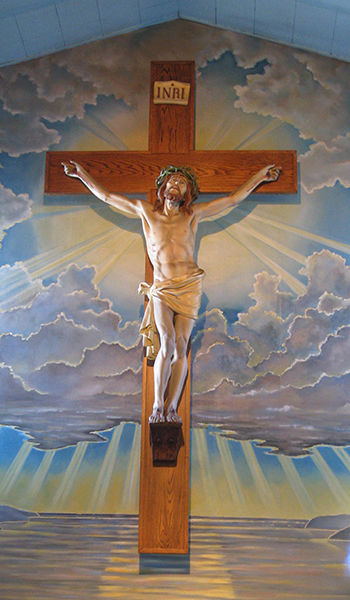As a missionary working in Jos, in central Nigeria, I was sometimes asked to give a ride to one of my friends who needed to go to the airport in Kano, about four hours north of Jos.
On one such occasion, after I had dropped my friend at the airport, as I was leaving the old walled city of Kano, I was stopped at a police checkpoint. A policeman, after asking me where I was going, asked if I would give a ride to a friend of his who had to go to Jos. “No problem!” I said. “Great to have someone to talk to on the journey.”
A gentleman got in, dressed in a flowing white riga. After the usual pleasantries, he asked what I was doing in Nigeria. I told him that I was a Catholic priest and that I was teaching in Jos. After sitting in silence he said, “I could never be a Christian!” Why, I asked.
He responded: “I could never have as the central symbol of my faith the image of a man nailed to a cross. I find that insulting to God and insulting to humanity!”
I was shocked at this statement. And then, for the first time in my life, I realized how strange it must be for someone who is not familiar with the story of Christ to even begin to imagine what the Cross means for us who have received the gift of faith.
I had grown up in Ireland where the Cross was everywhere. We were taught as kids that the first thing we must do on waking up and the last thing before we went to sleep was to make the sign of the cross. A crucifix hung in my bedroom. At school it was in each classroom. Every gravesite was marked with a Cross — it was everywhere, so much so that I took it for granted. I had domesticated it! It did not shock me in any way.
I spent the rest of the journey trying to explain to my travelling companion just what the Cross meant for me and for my fellow Christians. I tried to explain to him that for us it is the symbol of the greatest act of love that has ever been made — the most profound expression of the extraordinary love that God has for each and every one of us.
In Christ, God embraced humanity, and in that humanity, He, the absolutely sinless One, took upon himself our sin and the consequences of it. On the Cross he allowed Himself to be executed as a criminal (and the charge against Him was precisely the charge of sin: blasphemy!). “Greater love than this no man has’...”
In this time of Lent the Church once again invites us as Christians to contemplate the mystery of the Cross and, in that contemplation, rediscover again the transformative power of God’s love for us. All true love is creative of life. And God’s love creates in us God’s life, eternal life.
It was the overflow of God’s love that brought the world into existence in the first place; it is God’s love that keeps it in existence, minute by minute, day by day, year by year. It was God’s love that created us as subjects, endowing us with a participation in His own infinite freedom, so that His relationship with us would be a subject-subject relationship. He created us so that as subjects we could enter into and share in His eternal life.
When we contemplate the Cross, we hear God speaking to us: “Look at Me! This is how much I love you! I will take your death to Myself, a death that sin has brought into the world; I have conquered that sin and therefore that death, so that you might share in my eternal life and happiness. Do not be afraid; I have overcome all sin and all death! Trust Me!”
The Resurrection is the great proclamation of His victory over sin, and therefore the sure foundation of our hope, the central core of our faith. If we embrace the Cross, we allow ourselves to be embraced by Infinite Love, Infinite Life. In that embrace, God transforms us and “a terrible beauty is born!”
On the Cross Jesus revealed that our dying is in reality a birthing. And through death we are born into the fullness of God’s own life.
At the end of our journey in Jos, we each went our separate ways; I never met the man again. But who knows? Perhaps he too may have heard the Good News that is the Cross of Christ.
African Mission Society Father Jack Brennan is a professor at St. John’s Seminary, Camarillo. This is the third article in a Lenten series.

